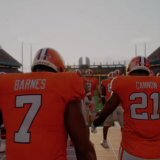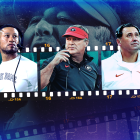A crowdfunding website has moved ahead with plans to pay college athletes. FanPay recently launched live contributions for players to collect money once they graduate and have no playing eligibility left.
Anonymous donors have funded a combined $940 for 11 football, basketball and volleyball players through FanPay, a for-profit crowdfunding company started by three Notre Dame graduates. Crowdfunding is the practice of financing a project or venture by raising contributions from a large number of people, typically through the Internet.
During the fall, FanPay received more than 100 cease-and-desist letters from universities and conferences, and the NCAA published an educational column about athletes’ eligibility in relation to crowdfunding. The NCAA has said once an athlete accepts the promise of pay, his or her eligibility is jeopardized, even if funds are not dispersed until after college.
The founders of FanPay consulted with an attorney in moving forward with its plans. FanPay says players can accept or refuse the funds and that the money isn’t offered while they have eligibility remaining.
“You can’t accept something not offered to them yet,” said Tony Klausing, one of FanPay’s founders. “We think we’re in compliance with NCAA bylaws, but let’s be clear: We aren’t the NCAA. They can kind of do what the heck they want to do. We wanted to design this platform as a practical means for student-athletes to be paid quickly. We’re very confident we’re in compliance with all applicable laws. How the NCAA reacts, that’s up to them.”
The NCAA did not immediately respond to a request for comment on Thursday.
Many of the cease-and-desist letters by schools and conferences to FanPay cited an NCAA rule that says if an athlete's name or picture appears on commercial items or is used to promote a product without the athlete's knowledge or permission, the school or athlete is required to take steps to stop the activity. So far, 11 college athletes (seven of whom recently graduated) have received donations at fanpay.org:
* UCF senior football players Justin Tukes ($150), J.J. Worton ($100) and Terrance Plummer ($50)
* Texas Tech senior football player Bradley Marquez ($150)
* Oregon State senior football player Obum Gwacham ($125)
* Alabama senior football player Arie Kouandjio ($100)
* Cal senior volleyball player Christina Higgins ($100)
* Vanderbilt senior football player Andrew Bridges ($75)
* Virginia senior football player Anthony Harris ($50)
* Louisville junior basketball player Montrezl Harrell ($20)
* Kentucky junior basketball player Alex Poythress ($20)
Once a player has graduated and has no eligibility left, he or she has 90 days to inquire about the funds from FanPay. The player could refuse the funds, in which case the money would be reimbursed by FanPay onto the donor’s credit card except for FanPay’s cut of the donation. FanPay collects fees ranging from 2 percent to 6 percent, meaning a $100 gift might cost a donor $104 with FanPay keeping $4 that’s non-refundable.
“The reality is we’re not making very much money,” Klausing said. “We just want to design a helpful platform and a lot of startups require a mass audience so we don’t want to discourage people from contributing.”
It's not clear how FanPay will notify players that they have money waiting for them.
“We haven't quite figured that out,” Klausing said. “Most universities, you can look up a student’s email address, and a lot of people have Twitter. We’re not really too concerned about finding these first students. The idea is that when some students find others are getting graduation gifts, they’ll say, ‘Heck, I’ll check if I have some money there as well.’”
Klausing said FanPay will verify whether a player has graduated by getting an official transcript from the student or through the National Student Clearinghouse. Players can receive their donated money through a direct transfer to their bank account or by check.
FanPay’s website currently allows people to donate money to virtually any college athlete at all NCAA level in four sports — football, men’s basketball, women’s basketball and volleyball. More sports are going to be rolled out in the coming weeks. The site allows a player to opt out of the service and not have his or her name listed.




















